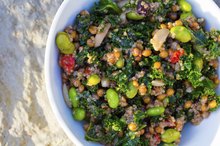Vitamins for Back Pain
Back pain is a common medical condition that affects approximately 75 percent of Americans at some point in their lives, according to David Gutknecht, author of the book “Low Back Pain FAQs.” Symptoms might include muscle aches, stabbing pain that radiates down your legs, limited flexibility in your back and the inability to stand for prolonged periods of time. The cause varies, but back pain might develop as a result of arthritis, bulging discs, skeletal abnormalities, premenstrual syndrome, strains, osteoporosis or spinal infections. A variety of vitamins can ease back pain and restore your back to optimal health.
Vitamin B-12
Vitamin B-12 is a water-soluble vitamin that aids in red blood cell production, supports healthy nerve cells, reduces pressure in your back, eases chronic back pain and lowers your risk of pernicious anemia, a type of anemia that occurs when your body cannot properly absorb vitamin B-12 from your gastrointestinal tract. The recommended daily dosage for vitamin B-12 is 2,000 micrograms daily for adults. Foods rich in vitamin B-12 include milk, eggs, fish, cheese and liver.
Vitamin C
Signs & Symptoms of a Tight Trapezius Muscle
Learn More
Vitamin C is a water-soluble antioxidant that strengthens your immune system and protects your back from damaging free radicals. Vitamin C also aids in collagen production, repairs damaged tissues, decreases inflammation, accelerates the healing process and reduces your risk of chronic back pain, according to the Center for Spinal Disorders, or CSD. The recommended daily dosage for vitamin C is 1,000 milligrams for adults. Foods rich in vitamin C include oranges, grapefruits, cranberries, strawberries, broccoli, tomatoes, spinach and kale.
- Vitamin C is a water-soluble antioxidant that strengthens your immune system and protects your back from damaging free radicals.
Vitamin D
Vitamin D is a fat-soluble vitamin that produces new bone cells, keeps your bones healthy and strong, aids in calcium absorption, lowers your risk of osteoporosis and rickets, decreases inflammation in your body and alleviates back pain, explains CSD. The recommended daily dosage of vitamin D is 600 international units for adults. Foods rich in vitamin D include salmon, mackerel, tuna, margarine, Swiss cheese, eggs, ready-to-eat cereals and milk.
Vitamin E
Vitamin B12 for Back Pain
Learn More
Vitamin E is a fat-soluble vitamin that boosts immune system function, reduces muscle pain and soreness, helps produce red blood cells, improves circulation, aids in the healing process and prevents the breakdown of and repairs damaged tissues, according to a report from Ohio State University. The recommended daily dosage for vitamin E is 15 mg for adults. Foods rich in vitamin E include wheat germ, corn, nuts, seeds, olives, spinach, kale, Swiss chard, asparagus, corn oil and soybean oil.
Related Articles
References
- “Low Back Pain FAQs”; David Gutknecht
- Understanding Chronic Pain; Angela J. Koestler and Ann Myers
- Clinician's Guide to Holistic Medicine; Robert Anderson
- Vitamins and Minerals Demystified; Steve Blake
- Natural Pharmacy: Complete A-Z Reference to Alternative Treatments for Common Health Conditions; Alan Gaby, et al.
- Nutrition Almanac; Lavon Dunne
- Singapore Medicine: The Effcacy and Safety of Intramuscular Injections of Methylcobalamin in Patients With Chronic Nonspecifc Low Back Pain: Arandomised Controlled Trial
- Ohio State University Extension: Vitamin E
- Holick MF, Gordon CM. Patient Guide to Vitamin D Deficiency. The Journal of Clinical Endocrinology & Metabolism. 2011;96(7):1-2. doi:10.1210/jcem.96.7.zeg33a
- Sunyecz JA. The use of calcium and vitamin D in the management of osteoporosis. Ther Clin Risk Manag. 2008;4(4):827-836. doi:10.2147/tcrm.s3552
- Giovannucci E, Liu Y, Hollis BW, Rimm EB. 25-hydroxyvitamin D and risk of myocardial infarction in men: a prospective study. Arch Intern Med. 2008;168(11):1174-1180. doi:10.1001/archinte.168.11.1174
- Gorham ED, Garland CF, Garland FC, et al. Optimal vitamin D status for colorectal cancer prevention: a quantitative meta analysis. Am J Prev Med. 2007;32(3):210-216. doi:10.1016/j.amepre.2006.11.004
- Lappe JM, Travers-Gustafson D, Davies KM, Recker RR, Heaney RP. Vitamin D and calcium supplementation reduces cancer risk: results of a randomized trial. The American Journal of Clinical Nutrition. 2007;85(6):1586-1591. doi:10.1093/ajcn/85.6.1586
- Prentice RL, Pettinger MB, Jackson RD, et al. Health risks and benefits from calcium and vitamin D supplementation: Women’s Health Initiative clinical trial and cohort study. Osteoporos Int. 2013;24(2):567-580. doi:10.1007/s00198-012-2224-2
- Urashima M, Segawa T, Okazaki M, Kurihara M, Wada Y, Ida H. Randomized trial of vitamin D supplementation to prevent seasonal influenza A in schoolchildren. Am J Clin Nutr. 2010;91(5):1255-1260. doi:10.3945/ajcn.2009.29094
- Salehpour A, Hosseinpanah F, Shidfar F, et al. A 12-week double-blind randomized clinical trial of vitamin D₃ supplementation on body fat mass in healthy overweight and obese women. Nutr J. 2012;11:78. doi:10.1186/1475-2891-11-78
- Carrillo AE, Flynn MG, Pinkston C, et al. Impact of vitamin D supplementation during a resistance training intervention on body composition, muscle function, and glucose tolerance in overweight and obese adults. Clin Nutr. 2013;32(3):375-381. doi:10.1016/j.clnu.2012.08.014
- Marcinowska-Suchowierska E, Kupisz-Urbańska M, Łukaszkiewicz J, Płudowski P, Jones G. Vitamin D Toxicity-A Clinical Perspective. Front Endocrinol. 2018;9:550. doi:10.3389/fendo.2018.00550
- Ross AC, Manson JE, Abrams SA, et al. The 2011 report on dietary reference intakes for calcium and vitamin D from the Institute of Medicine: what clinicians need to know. J Clin Endocrinol Metab. 2011;96(1):53-58. doi:10.1210/jc.2010-2704
- Bouillon R, Van Schoor NM, Gielen E, et al. Optimal vitamin D status: a critical analysis on the basis of evidence-based medicine. J Clin Endocrinol Metab. 2013;98(8):E1283-E1304. doi:10.1210/jc.2013-1195
- American Academy of Dermatology. Position Statement of Vitamin D. 2010.
- Taksler GB, Cutler DM, Giovannucci E, Keating NL. Vitamin D deficiency in minority populations. Public Health Nutr. 2015;18(3):379-391. doi:10.1017/S1368980014000457
- Holick MF, Binkley NC, Bischoff-Ferrari HA, et al. Evaluation, treatment, and prevention of vitamin D deficiency: an Endocrine Society clinical practice guideline. J Clin Endocrinol Metab. 2011;96(7):1911-1930. doi:10.1210/jc.2011-0385
- Cannell JJ, Vieth R, Umhau JC, et al. Epidemic Influenza and Vitamin D. Epidemiol Infect. 2006; 134:1129-40.
- Carrillo AE1, Flynn MG, Pinkston C, Markofski MM, Jiang Y, Donkin SS, Teegarden D. Impact of Vitamin D Supplementation During a Resistance Training Intervention on Body Composition, Muscle Function, and Glucose Tolerance in Overweight and Obese Adults. Clin Nutr. 2013 Jun;32(3):375-81. doi: 10.1016/j.clnu.2012.08.014. Epub 2012 Aug 31.
- Ginde AA, Mansbach JM, Camargo CA, Jr. Association Between Serum 25-Hydroxyvitamin D Level and Upper Respiratory Tract Infection in the Third National Health and Nutrition Examination Survey. Arch Intern Med. 2009; 169:384-90.
- Giovannucci E, Liu Y, Hollis BW, Rimm EB. 25-hydroxyvitamin D and Risk of Myocardial Infarction in Men: a Prospective Study. Arch Intern Med. 2008; 168:1174-80.
- Gorham ED, Garland CF, Garland FC, Grant WB, Mohr SB, Lipkin M, Newmark HL, Giovannucci E, Wei M, Holick MF. Optimal Vitamin D Status for Colorectal Cancer Prevention: a Quantitative Meta-analysis. Am J Prev Med. 2007 Mar;32(3):210-6.
- Heaney, Robert P. “The Vitamin D Requirement in Health and Disease.” The Journal of Steroid Biochemistry & Molecular Biology 97 (2005):13-9.
- Holick MF. Vitamin D. In: Shils M, Olson J, Shike M, Ross AC, ed. Modern Nutrition in Health and Disease, 9th ed. Baltimore: Williams and Wilkins, 1999.
- National Institutes of Health Office of Dietary Supplements. Vitamin D: Dietary Supplement Fact Sheet. University of Ottawa Evidence-based Practice Center. Effectiveness and Safety of Vitamin D in Relation to Bone Health. Agency for Healthcare Research and Quality. Aug 2007: 07-E013.
- Salehpour A1, Hosseinpanah F, Shidfar F, Vafa M, Razaghi M, Dehghani S, Hoshiarrad A, Gohari M. A 12-week Double-blind Randomized Clinical Trial of Vitamin D₃ Supplementation on Body Fat Mass in Healthy Overweight and Obese Women. Nutr J. 2012 Sep 22;11:78. doi: 10.1186/1475-2891-11-78.
- Urashima M, Segawa T, Okazaki M, Kurihara M, Wada Y, Ida H. Randomized Trial of Vitamin D Supplementation to Prevent Seasonal Influenza A in Schoolchildren. Am J Clin Nutr. 2010 91:1255-60. Epub 2010 Mar 10.
- Wilkins, Consuelo H. and Yvette I. Sheline, et al. “Vitamin D Deficiency Is Associated with Low Mood and Worse Cognitive Performance in Older Adults.” American Journal of Geriatric Psychiatry 14 (2006): 1032-40.
Writer Bio
R. Y. Langham served as a senior writer for "The Herald" magazine from 1996-99. Langham holds a Bachelor of Arts in English from Fisk University, a Master of Science in marriage and family therapy from Trevecca Nazarene University and a Ph.D in family psychology from Capella University. Dr. R.Y. Langham published her first psychological thriller in September 2011. It can be purchased on Amazon.com, Barnes&Noble.com and Lulu.com.







